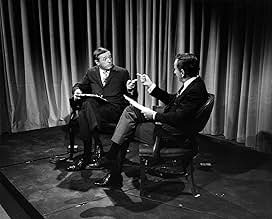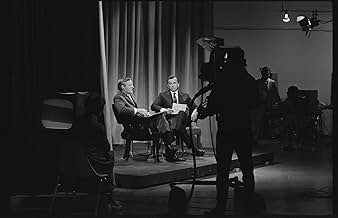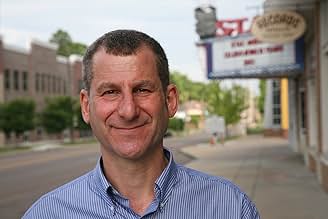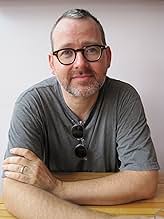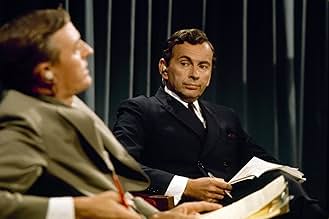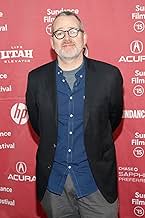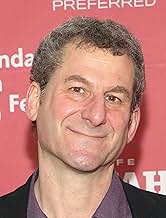IMDb रेटिंग
7.6/10
6.6 हज़ार
आपकी रेटिंग
अपनी भाषा में प्लॉट जोड़ेंA documentary on the series of televised debates in 1968 between liberal Gore Vidal and conservative William F. Buckley.A documentary on the series of televised debates in 1968 between liberal Gore Vidal and conservative William F. Buckley.A documentary on the series of televised debates in 1968 between liberal Gore Vidal and conservative William F. Buckley.
- निर्देशक
- लेखक
- स्टार
- पुरस्कार
- 6 जीत और कुल 27 नामांकन
Gore Vidal
- Self - Debater
- (आर्काइव फ़ूटेज)
William F. Buckley
- Self - Debater
- (आर्काइव फ़ूटेज)
Noam Chomsky
- Self
- (आर्काइव फ़ूटेज)
Patricia Buckley
- Self - Buckley's Wife
- (आर्काइव फ़ूटेज)
Sam Donaldson
- Self - Correspondent, ABC News
- (आर्काइव फ़ूटेज)
Howard K. Smith
- Self - Anchor, ABC News
- (आर्काइव फ़ूटेज)
फ़ीचर्ड समीक्षाएं
Best of Enemies is a fascinating documentary film about a series of nationally televised debates in 1968 between two public intellectuals, the liberal Gore Vidal and the conservative William F. Buckley Jr. If that doesn't sound very interesting you couldn't be more wrong. This is a film about two men who absolutely hated each other. Two extremely clever men who fought each other live on television by debating with each that eventually led to personal insults being thrown at each other and it's mesmerising viewing. I have to admit I had never heard of these men before and that's probably because these debates happened a couple of months before I was born but I do know now and I feel much better off for it.
Most people who come to Best of Enemies knows what the state of news media coverage is, especially in the realm of cable news. It's been bad for a long time (there's a very brief excerpt of the time when Jon Stewart called out Crossfire for the very problems that can be seem sprouting up in the film in the end credits). But what's so great about Best of Enemies is how you see that the groundwork laid at the beginning for what's been twisted into the barking (less talking) heads in coverage of the daily events (let alone political conventions) is seen as relatively cordial and sophisticated. Sure, William F. Buckley Jr and Gore Vidal might not be everyone's idea of a good time with a glass of beer (though that depends on what class system rank you're in), but, perhaps except for one major outburst from Buckley - which haunted him for years (or he just became obsessed with it like a cry-baby, you decide) - they were so evenly matched as far as their scope of intellectual prowess that it boggles the mind.
Over the course of Best of Enemies we get to see what these two men were like, before the debates in 1968 and then after, and there's this monumental point of view (probably totally correct) that the directors give which is that TV changed things for the public so much that two people arguing about this or that could change things, like concretely in people's minds. But past it being of interest in a sociological or political science interest is the emphasis that these two men *really* did not like one another. Perhaps there was some unspoken level of respect, that sort of look of 'hey, let's give them a show' (and apparently after one of the tenser debates, Buckley leaned over and almost paid a compliment that that's what they did). But watching the scenes here I can't imagine anyone walking away thinking it was just an act, and yet at the same time I think there was an element of the theatrical; one of the revelations is that Vidal tested some of his retorts to Buckley on staffers or crew before filming.
The documentary may be borderline on too much context in a way - the talking heads from (the late) Christopher Hitchens and Dick Cavett and Buckley's biographer shine some light on certain aspects of their personalities (how personally Buckley took things, and how Vidal kept things under lock and key what he showed on his face). It can even be said there isn't quite enough of the debates in the film, and that's the one thing keeping it from being a 10 out of 10. But sometimes the best movies are never long enough, and this is a case where I could watch another 30 to 60 minutes of this story, especially as it's set in the tumultuous time of 1968 at Republican and Democratic conventions (the latter being when Chicago went into a series of riots). As long as the filmmakers keep the focus on these two men looking at each other and sniping in sardonic and totally dead-serious ways, the film works wonders. And you also get thrown into the mood of the period through music that almost has the buzz of technology, of TV electronic-waves and such.
If the medium is/was the message, then having two men argue at a time when there were only three channels with ABC hosting it had to do something different to compete with Cronkite and the like (and as one person says in the doc, argument is sugar ans we are the flies) made the message clear: conflict and drama makes for much more enticing (and perhaps simply easier) viewing than watching straight, down-the-middle factual news reporting. Who needs the facts when you got the paragon of the Conservative right (Buckley, by the way, has that sort of smile and grin that is both charming and kind of creepy) and of the intellectual, hardcore left (Vidal, with his books making him like an unofficial if sometimes controversial arbiter of history). Check it out - and ponder if either of these men could last a minute on Fox news or even CNN.
Over the course of Best of Enemies we get to see what these two men were like, before the debates in 1968 and then after, and there's this monumental point of view (probably totally correct) that the directors give which is that TV changed things for the public so much that two people arguing about this or that could change things, like concretely in people's minds. But past it being of interest in a sociological or political science interest is the emphasis that these two men *really* did not like one another. Perhaps there was some unspoken level of respect, that sort of look of 'hey, let's give them a show' (and apparently after one of the tenser debates, Buckley leaned over and almost paid a compliment that that's what they did). But watching the scenes here I can't imagine anyone walking away thinking it was just an act, and yet at the same time I think there was an element of the theatrical; one of the revelations is that Vidal tested some of his retorts to Buckley on staffers or crew before filming.
The documentary may be borderline on too much context in a way - the talking heads from (the late) Christopher Hitchens and Dick Cavett and Buckley's biographer shine some light on certain aspects of their personalities (how personally Buckley took things, and how Vidal kept things under lock and key what he showed on his face). It can even be said there isn't quite enough of the debates in the film, and that's the one thing keeping it from being a 10 out of 10. But sometimes the best movies are never long enough, and this is a case where I could watch another 30 to 60 minutes of this story, especially as it's set in the tumultuous time of 1968 at Republican and Democratic conventions (the latter being when Chicago went into a series of riots). As long as the filmmakers keep the focus on these two men looking at each other and sniping in sardonic and totally dead-serious ways, the film works wonders. And you also get thrown into the mood of the period through music that almost has the buzz of technology, of TV electronic-waves and such.
If the medium is/was the message, then having two men argue at a time when there were only three channels with ABC hosting it had to do something different to compete with Cronkite and the like (and as one person says in the doc, argument is sugar ans we are the flies) made the message clear: conflict and drama makes for much more enticing (and perhaps simply easier) viewing than watching straight, down-the-middle factual news reporting. Who needs the facts when you got the paragon of the Conservative right (Buckley, by the way, has that sort of smile and grin that is both charming and kind of creepy) and of the intellectual, hardcore left (Vidal, with his books making him like an unofficial if sometimes controversial arbiter of history). Check it out - and ponder if either of these men could last a minute on Fox news or even CNN.
A well-constructed must-see documentary for anyone who is the least bit interested in the politics of journalism. Don't worry that you won't recall/aren't aware of the background. The filmmakers do an excellent job of setting the stage, and an even more impressive job of avoiding the actual political issues in order to focus on the medium. If you want to know how we got where we are, start at the beginning. This is the genesis of punditry and personality-driven journalism. This is not to say that this little slice of evolution is necessarily bad. As the film points out, prior to 1968 the presentation of news was quite static, with little, if any, chance for anything out of the mainstream to make it out of the studio. Now the genie has been loosed from the bottle, and he has truly been feeling his oats for the past several years. It's up to us to rein him in, give him focus, and pray that we can find some common ground before the growing political mitosis reaches the point of no return.
The legacy of William F. Buckley, Jr. is not necessarily his 'National Review'; it isn't his devotion to the Buckley pere's hatred of FDR's New Deal, an act deemed a patrician's treachery to his class; it is the implosion of what his brother Reid concretes him as a revolutionary who ushered in the conservative revolution that we see in the impossible array of 17 candidates for the 2016 Republican nomination for the American presidency and the rise of Donald Trump. But, in 'Best of Enemies' trans-political make over is a glint in Buckley's eye as he faced the talented Gore Vidal as they 'commented' on the 1968 Republican convention in Miami and then the Democratic convention in Daley's Chicago. Who has read Buckley's apologia pro sua vita as spy for the FBI 'God and Man at Yale' today? Brilliant, effete, an amateur of the harpsicord,a seasoned sailor, he thought of himself the American heir to the little read GK Chesterton, in his affected speech. He could demolish in high disdain the arguments of his guests on 'Firing Line', guests like Norman Mailer, Allan Ginsberg and the like. Buckley was a man of the right--God, Country, Law and Order, who fought those critics of his values not necessarily in the name of freedom and humanity but in defense of older medieval values by attacking contemporary secular culture. And the embodiment of his distaste was the writer, playwright and commentator on things cultural and political Gore Vidal. ABC pitted these two 'aristocrats' of polished English as a wedge in the wall-to-wall coverage of the conventions by rivals CBS and NBC, at a time nightly television news was accepted more or less straight by the American people. From the get go, it was obvious that these two mavens of the Verb mutually loathed one another. Buckley shucking and sliding verbally, eyes popping, a supercilious grin on his lip as he flung mud at Vidal, not so much on what he said about the convention but for what he stood for. Remember, Gore Vidal had broken taboos for his 'Myra Breckenridge', about a transgendered man, light years ahead of the much admired Caitlin Jenner, a Republican. To Buckley, the writer of note was an enemy of God and patrician values and yes even to an elite education which Gore Vidal didn't pursue--he was a drop out who joined the Army during WW2, serving in Alaska where he wrote his much praised 'Williwaw'. Vidal was a 'revolutionary' in his own way; he published 'The City and the Pillar', which had a homosexual theme, that so exasperated the Old Grey Lady, the New York Times, which boycotted reviewing any of his books till decades later when they couldn't ignore his obvious talent. And in Gore, Buckley met more than his equal, so much so that until his death he wouldn't pronounce the V word. Buckley and Vidal were bellwethers; each had a finger on the rage and discontent of the times. And according to the talking heads, their 10 debates radically changed political discourse that now plagues our own day. 'Best of Enemies' is more than nostalgia, it is a palimpsest for the soul of the American soul. Buckley was an admirer of authoritarianism that Vidal was not. And it was to Vidal's credit that he pierced the supercilious armor of Buckley that, despite the adulation of his peers, rendered a life of hobnobbing with the rich and famous, the anti-Semites and racists, made him lose his 'cool' and restful nights of sleep. Even though he called Vidal a 'queer' (which wasn't a slur a half-century ago), Vidal suspected that he was a closet case, going as far as saying he was an incarnation of Myron Breckenridge. (For those who want to read about the conventions in Miami and bloody Chicago,Norman Mailer's 'Miami and the Siege of Chicago' is not a bad place to begin.
Gavel-to-gavel coverage of the Republican and Democratic national conventions was still being offered by CBS and NBC in 1968, but ABC, lacking their resources, limited their coverage to a few hours in the evening and highlighted it with a ten-night debate between conservative author and commentator William F. Buckley Jr. and flamboyant liberal novelist and playwright Gore Vidal. These debates are chronicled in the powerful documentary Best of Enemies directed by Robert Gordon ("Johnny Cash's America") and Morgan Neville ("Twenty Feet From Stardom").
In addition to fully restored original broadcast footage, the film includes commentaries from people who knew Buckley and Vidal such as former TV talk show host Dick Cavett, journalist Frank Rich, authors Christopher Hitchens and Andrew Sullivan, Buckley biographer Sam Tanenhaus, Vidal's last magazine editor, Matt Tyrnauer among others, while actors Kelsey Grammar and John Lithgow read passages from the writings of both men.
Though both men had previously run for public office (Vidal for Congress, Buckley for Mayor of New York), their forte was not politics but writing. Buckley was the founder and editor of the influential conservative magazine The National Review, and Vidal was a controversial novelist and playwright whose sexually liberated views were in evidence in his novels "The City and the Pillar" and "Myra Breckinridge." Both men spoke in the accents of Eastern elites, what Neil Buckley, Bill's surviving brother, describes as "patrician, languid accents," yet both were erudite with acid tongues.
To say that Buckley and Vidal did not get along is like saying Bobby Kennedy and James Hoffa were not the best of friends. Vidal knew that Buckley had supported using nuclear weapons against North Vietnam and China, and called him "a bloodthirsty neurotic," while Buckley retorted, "We all know that your tendency is to be feline." The Democratic Convention was held in Chicago where protests against the Vietnam War and the subsequent police overreaction threatened to derail the nominating process, creating a highly-charged atmosphere for the debates that only enhanced the acrimony.
One of the highlights occurred in the ninth of ten debates where the debaters clashed over the extent of the police response against the demonstrators and both stepped out of their well-calculated cool, intellectual personas. The discussion began with the revelation that the police had removed a Viet Cong flag from the demonstration. While Vidal defended the right of the demonstrators to state their political views, Buckley noted that during World War II, people were free to ostracize pro-Nazi spokesman even though they were free to speak their views. Vidal responded by saying that "the only sort of crypto-Nazi I can think of is yourself." Though the moderator Howard K. Smith warned both men against name calling, a red-faced Buckley, his hands trembling, shouted, "Now listen, you queer, stop calling me a crypto-Nazi or I'll sock you in your goddamn face, and you'll stay plastered." It was a moment that Buckley regretted, though the feud continued with competing articles in Esquire Magazine and subsequent law suits. Best of Enemies is provocative and terrific entertainment but while the edited debates are pure theater, full of witty banter and relentless thrusts and parries, they are less than illuminating as a contribution to the troubling issues of the time and include no discussion of the most important issue of the day, the Vietnam War.
Although issues such as economic inequality, foreign involvements, and issues of morality and culture were discussed, the debates were not a conflict over positions on issues as much as they were a battle between two individuals convinced the other was a threat to the health and well-being of the country.
Many commentators in the film are full of nostalgia for the day when intellectuals were seen on television and point to today's cable news pundits screaming at each other (rather than the corporatization of the media and the over-dependence on ratings) as evidence of the decline of American television, but if the Buckley-Vidal debates are an example of the intellectual vitality of television in the sixties, I think I'd rather stick with Rachel Maddow.
In addition to fully restored original broadcast footage, the film includes commentaries from people who knew Buckley and Vidal such as former TV talk show host Dick Cavett, journalist Frank Rich, authors Christopher Hitchens and Andrew Sullivan, Buckley biographer Sam Tanenhaus, Vidal's last magazine editor, Matt Tyrnauer among others, while actors Kelsey Grammar and John Lithgow read passages from the writings of both men.
Though both men had previously run for public office (Vidal for Congress, Buckley for Mayor of New York), their forte was not politics but writing. Buckley was the founder and editor of the influential conservative magazine The National Review, and Vidal was a controversial novelist and playwright whose sexually liberated views were in evidence in his novels "The City and the Pillar" and "Myra Breckinridge." Both men spoke in the accents of Eastern elites, what Neil Buckley, Bill's surviving brother, describes as "patrician, languid accents," yet both were erudite with acid tongues.
To say that Buckley and Vidal did not get along is like saying Bobby Kennedy and James Hoffa were not the best of friends. Vidal knew that Buckley had supported using nuclear weapons against North Vietnam and China, and called him "a bloodthirsty neurotic," while Buckley retorted, "We all know that your tendency is to be feline." The Democratic Convention was held in Chicago where protests against the Vietnam War and the subsequent police overreaction threatened to derail the nominating process, creating a highly-charged atmosphere for the debates that only enhanced the acrimony.
One of the highlights occurred in the ninth of ten debates where the debaters clashed over the extent of the police response against the demonstrators and both stepped out of their well-calculated cool, intellectual personas. The discussion began with the revelation that the police had removed a Viet Cong flag from the demonstration. While Vidal defended the right of the demonstrators to state their political views, Buckley noted that during World War II, people were free to ostracize pro-Nazi spokesman even though they were free to speak their views. Vidal responded by saying that "the only sort of crypto-Nazi I can think of is yourself." Though the moderator Howard K. Smith warned both men against name calling, a red-faced Buckley, his hands trembling, shouted, "Now listen, you queer, stop calling me a crypto-Nazi or I'll sock you in your goddamn face, and you'll stay plastered." It was a moment that Buckley regretted, though the feud continued with competing articles in Esquire Magazine and subsequent law suits. Best of Enemies is provocative and terrific entertainment but while the edited debates are pure theater, full of witty banter and relentless thrusts and parries, they are less than illuminating as a contribution to the troubling issues of the time and include no discussion of the most important issue of the day, the Vietnam War.
Although issues such as economic inequality, foreign involvements, and issues of morality and culture were discussed, the debates were not a conflict over positions on issues as much as they were a battle between two individuals convinced the other was a threat to the health and well-being of the country.
Many commentators in the film are full of nostalgia for the day when intellectuals were seen on television and point to today's cable news pundits screaming at each other (rather than the corporatization of the media and the over-dependence on ratings) as evidence of the decline of American television, but if the Buckley-Vidal debates are an example of the intellectual vitality of television in the sixties, I think I'd rather stick with Rachel Maddow.
क्या आपको पता है
- ट्रिवियाThe film-makers shot an interview with Gore Vidal, but ultimately decided not to use it, so he only appears in archive footage.
- भाव
Richard Wald: ABC was the third of the three networks. It would've been fourth, but there were only three.
- क्रेज़ी क्रेडिटThere is a short scene after the credits showing footage of an interview with Buckley.
- कनेक्शनEdited into Independent Lens: Best of Enemies (2016)
टॉप पसंद
रेटिंग देने के लिए साइन-इन करें और वैयक्तिकृत सुझावों के लिए वॉचलिस्ट करें
- How long is Best of Enemies: Buckley vs. Vidal?Alexa द्वारा संचालित
विवरण
- रिलीज़ की तारीख़
- कंट्री ऑफ़ ओरिजिन
- आधिकारिक साइट
- भाषा
- इस रूप में भी जाना जाता है
- Best of Enemies: Buckley vs. Vidal
- उत्पादन कंपनियां
- IMDbPro पर और कंपनी क्रेडिट देखें
बॉक्स ऑफ़िस
- बजट
- $10,00,000(अनुमानित)
- US और कनाडा में सकल
- $8,92,802
- US और कनाडा में पहले सप्ताह में कुल कमाई
- $50,378
- 2 अग॰ 2015
- दुनिया भर में सकल
- $8,92,802
- चलने की अवधि1 घंटा 27 मिनट
- रंग
इस पेज में योगदान दें
किसी बदलाव का सुझाव दें या अनुपलब्ध कॉन्टेंट जोड़ें



